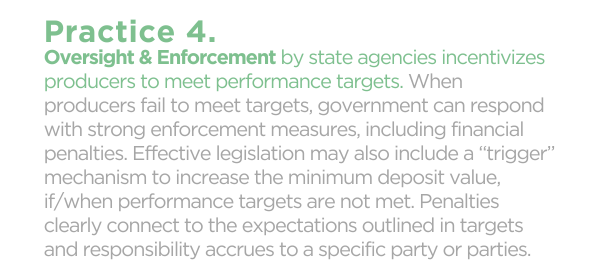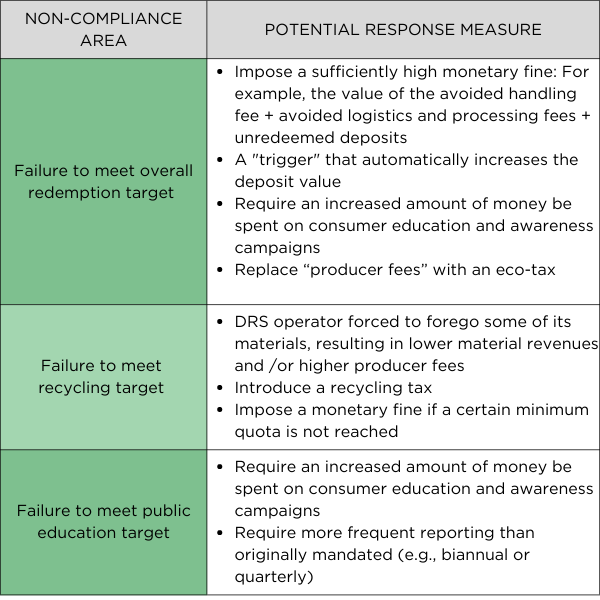Hello to Incentives for a Modern DRS!
Welcome to the 14th issue of Bottle Bill Common Ground — a limited-series newsletter from Reloop North America highlighting evidence-based guidance for policy makers, industry, and advocates working on bottle bills. (If you haven’t read our first 13 issues, you can do so here.)
We are now focused on 10 essential practices — requirements on how to build, run, and maintain a modern deposit return system (DRS) for beverage containers. The fourth essential practice is:

Oversight and enforcement by state agencies should have one overarching goal — to incentivize producers to meet the system requirements set out in legislation, including performance targets. That’s why effective bottle bill legislation outlines the minimum responsibilities for the regulatory government agency and then enables it to respond with strong enforcement measures when producers or other parties deviate from their legal responsibilities.
In a high-functioning DRS, producers should have the authority to run the system as they see fit. However, that doesn’t diminish the crucial need for robust oversight and enforcement. Guardrails and careful monitoring are key to striking the right balance between the private sector’s efficiency and innovation on the one hand, while ensuring optimized social and environmental outcomes on the other.
Sound legislation for DRSs is outcome-oriented. The role of government should include:
- Setting and enforcing performance targets, such as minimum redemption rates
- Adjusting the minimum deposit amount if redemption targets are not achieved during an agreed-on number of consecutive years
- Ensuring consumers can conveniently redeem containers
- Overseeing stakeholders and enforcing penalties in cases of non-compliance
- Carrying out regular and random audits
- Potential membership in the program’s key decision-making body, such as an advisory council.
To fulfill these obligations, the regulatory body will need dedicated staff and resources. As with other Extended Producer Responsibility programs (also referred to in shorthand as EPR), a DRS should include producer funding for government oversight. The exact funding can be assessed case by case, but should be adequate to cover the full range of monitoring, auditing, and enforcement activities detailed below.
The most direct way that the government oversees the DRS is through official reporting. As discussed in last week’s Practice 3: Compliance and Official Reporting, the DRS operator should be legally obligated to report a set of data to the regulator on at least an annual basis.
Well-conceived legislation will include targets for rates of redemption, recycling, circularity, and participation as well as community access and awareness. Statutes may also include a “trigger” mechanism to increase the minimum deposit value, if/when performance targets are not met. If, after careful analysis, there is strong reason to doubt the reported information, the governing body should retain the authority to perform a financial or operational audit to determine the veracity of the annual report.
At a minimum, legislation and/or regulations must clearly state the penalties and enforcement measures, as well as the government agency responsible for enforcement. Penalties are developed with a clear connection to the expectations outlined in the targets, and draw a direct line of responsibility back to a specific party or parties.
Examples of different penalties or steps that governments can take to encourage compliance with various performance requirements include:

Case Study: Slovakia
Slovakia was the first Central European country to introduce a DRS in 2022. Manufacturers are responsible for managing and financing the program under EPR regulations, while the state plays a supervisory role. The system administrator, known as Správca zálohového systému, is a consortium of four associations representing beverage producers and retailers in Slovakia. The Ministry of the Environment oversees and regulates the system, ensuring transparent data and monetary flows and promoting the system to stakeholders and the public.
For instance, in terms of fines and penalties, the Slovak Government is prescriptive in their writing, such as the following excerpt:
Under Section 14 on the Imposition of Fines, under subsection 4 it is stated that (4) For an administrative offense as per § 13, subsection (h), the competent state supervisory authority shall impose a fine based on the weight of the unrecovered disposable packaging for drinks, expressed in tons, corresponding to the unfulfilled return target established in Annex no. 1 for the given calendar year, with a fine amount of 6,000 Euros.
The Slovak DRS regulation establishes the authority and responsibilities of government bodies in managing beverage packaging and waste. It includes provisions for state supervision, administrative offenses, and the imposition of fines. Slovakia’s legislation stipulates the Ministry’s authorities as follows:

The Ministry of Environment plays a crucial role in ensuring compliance with regulations; monitoring the system’s implementation and taking action against any violations. Most importantly, these duties and responsibilities are codified in the document enabling legislation. [Source]
Governments play a critical role in ensuring that DRSs achieve high performance, deliver a convenient and equitable user experience, and continually improve. In an optimized DRS, the regulatory agency actively maintains compliance, utilizes auditing and enforcement mechanisms when necessary, and is generally an empowered owner of the program’s success.
Thanks for reading! We encourage you to share this newsletter widely with those who want or need to know about these principles and practices. Working together from a common ground of knowledge, we can move good bottle bills forward. Sign up here to get these blog posts as emails.
